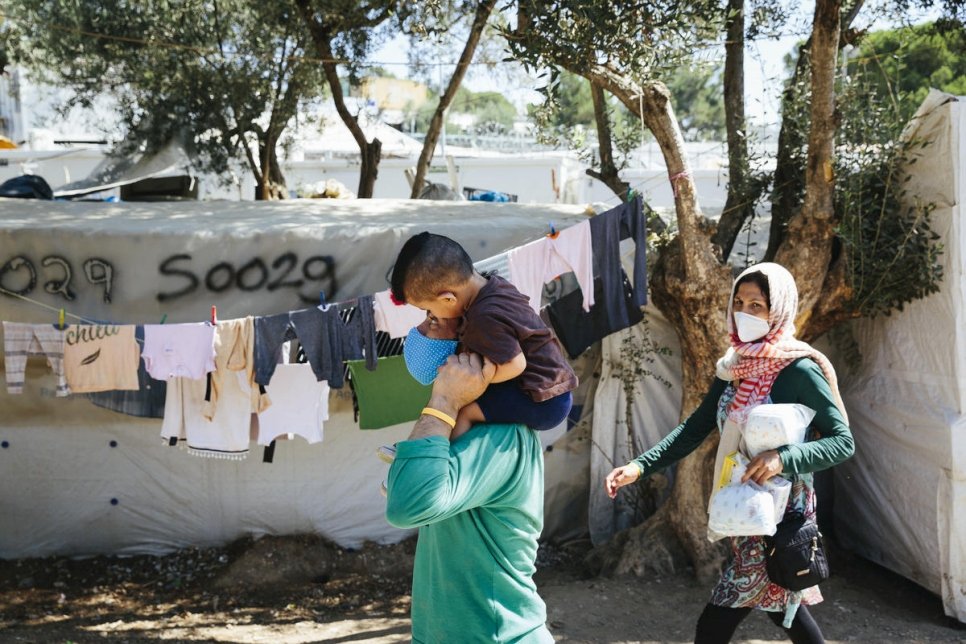UNHCR's Assistant High Commissioners visit Greece, discuss refugee protection challenges and urge more support

An Aghan refugee family walks through an informal camp outside the Moria Reception and Identification centre on the island of Lesbos, September 1, 2020. © UNHCR/Achilleas Zavallis
UNHCR’s Assistant High Commissioners for Protection and Operations, Gillian Triggs and Raouf Mazou, concluded a four-day visit to Greece today.
Their visit focused on issues relating to access to territory and asylum, living conditions for refugees and asylum-seekers on the mainland and the islands, the management of the COVID-19 response, child protection, alternatives to detention, refugee integration and the transition of accommodation and cash programmes from UNHCR, the UN Refugee Agency, to the Greek State.
“Greece and its people have shown tremendous solidarity and compassion with thousands of refugees and asylum-seekers, despite all the challenges the country has faced, including a severe economic crisis and now the COVID-19 pandemic,” said UNHCR’s Assistant High Commissioner for Operations, Raouf Mazou.
“But there are critical gaps and issues that must be addressed, including the urgent need to drastically improve living conditions and reduce overcrowding at the reception facilities on the Aegean Islands, as well as ensuring the full inclusion of refugees and asylum seekers in the COVID-19 response.”
More than one million refugees and migrants arrived in Europe through Greece since 2015. While the numbers of those arriving since have significantly dropped over the past five years, there are still people who continue to arrive in need of protection.
“We have had very constructive and open exchanges with the authorities including on the need to safeguard the right to seek asylum and to investigate the reports we have received of pushbacks at land and sea,” said UNHCR’s Assistant High Commissioner for Protection, Gillian Triggs.
“We reiterate our calls to the authorities to ensure access to territory and protection against refoulement for those in need of protection and also for long-term solutions to help refugees integrate into the country.”
In addition to meetings with Government officials leading on the refugee response, NGOs and humanitarian partners, the Assistant High Commissioners also met with refugees and asylum-seekers in Athens and Lesvos.
They consulted with refugees, including refugee women survivors of sexual and gender-based violence and with unaccompanied children, in need of safe homes or reunification with family members abroad. During their visit, they also met with families who are to depart to Germany as part of a relocation project supported and funded by the European Commission.
They also listened to the concerns expressed by families who were granted asylum in Greece but prematurely exited from basic assistance and shelter support programs and now face homelessness in Athens. They expressed to UNHCR’s Assistant High Commissioners their worries about their day-to-day subsistence and future prospects, in the absence of support to enable them to become self-reliant.
“We proposed concrete measures to the Greek authorities to help with refugee self-reliance and integration programs and we stand ready to support. Effective access to social protection and integration schemes are key and they stand to benefit refugees, their local communities and wider society,” said Triggs.
Given the challenges faced by Greece, UNHCR has been calling on the EU and its Member States to step up their support and demonstrate their solidarity, particularly through the relocation of vulnerable asylum-seekers.
UNHCR has been present in Greece since 1952. In Greece, UNHCR works to support national authorities in addressing asylum and reception needs, as well as supporting the inclusion of refugees and asylum seekers in national social services, and on self-reliance and socio-economic integration.
UNHCR is currently working with the authorities to transition the implementation of large-scale accommodation and cash-based assistance programmes to the Greek Government.
For more information on this topic, please contact:
- In Athens, Stella Nanou: [email protected], + 30 6944586037
- In Geneva, Shabia Mantoo: [email protected], +41 79 337 7650
- In New York, Kathryn Mahoney, [email protected], +1 347 443 7646
